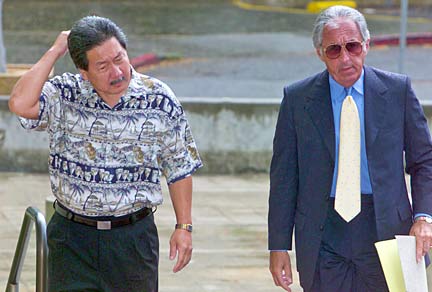
|
Tanonaka guilty
in campaign case
He admits to illegal and unreported
gifts while running for office
Former candidate for lieutenant governor and Congress Dalton Tanonaka did not intend to hide anything or cheat anyone when he failed to disclose $84,000 in illegal and unreported campaign donations, earned income and debts, as required by law, his attorney said yesterday.
But that does not make it OK, and he is owning up to it, defense attorney Michael Green said.
"This is breaking his heart and it's breaking his family's heart, but you know what? He's taking responsibility for it," Green said.
Tanonaka, 51, of Portlock, a former print and TV journalist, waived indictment and pleaded guilty yesterday before U.S. Magistrate Kevin Chang to three felony charges and a misdemeanor charge stemming from his failed campaigns for lieutenant governor and Congress. He declined comment.
Tanonaka was charged with two counts of making false statements on bank loan applications, one count of making false statements on a financial disclosure form and one count of accepting an illegal contribution in excess of the $2,000 limit.
Tanonaka faces a maximum of 30 years' imprisonment for making false statements on the bank loan application, five years for making false statements on the financial disclosure form and one year for receiving the illegal contribution.
The FBI began an investigation into Tanonaka's campaigns in November on a referral from the state Campaign Spending Commission.
The FBI said Tanonaka engaged in a "pattern of deceptive conduct" in his campaigns.
"Candidates for elective offices, like public officials, are held to a high standard of conduct, and it is essential that persons seeking and occupying these positions of trust be scrupulous in their observance of the laws," said Charles Goodwin, special agent-in-charge of the FBI here.
Under state campaign laws, individual donors can contribute no more than $6,000. And candidates can receive no more than $10,000 in loans from individuals, excluding themselves and family members, and must report the amount to the Campaign Spending Commission.
In a financial disclosure form filed with the U.S. House of Representatives for his congressional race in 2004, Tanonaka also failed to report fully as required all earned income, liabilities and positions he held, Assistant U.S. Attorney Michael Purpura said.
Tanonaka failed to report a consulting contract with IDB, which gave him a $10,000 monthly salary. He also did not report debts from the 2002 loans.
Tanonaka admitted to receiving $11,000 in illegal campaign contributions. He admitted soliciting and obtaining a $25,000 personal loan from his brother-in-law which was later funneled to his congressional campaign.
Ed Nishioka, who alleged Tanonaka was violating campaign laws in a complaint to the Campaign Spending Commission in September, said he was injured by Tanonaka's actions.
As president of a local marketing and consulting firm, Nishioka filed a lawsuit against Tanonaka in April 2004 seeking $40,000 he was owed for consulting work he provided for his 2002 campaign. That is when Tanonaka's questionable activities surfaced and Nishioka disclosed the information to the spending commission.
"My company and my family have been damaged by this situation, so I disagree that what he did was a victimless crime," Nishioka said.
Voters are hurt when campaign laws are violated, said Bob Watada, executive director of the Campaign Spending Commission.
Senate GOP Leader Fred Hemmings said his support for Tanonaka has not wavered, but that Tanonaka must pay for his mistakes. "He's obviously made some serious mistakes and has to pay the consequences, and by virtue of the guilty plea he's facing the consequences," Hemmings said.
E-mail to City Desk
[News] [Business] [Features] [Sports] [Editorial] [Do It Electric!]
[Classified Ads] [Search] [Subscribe] [Info] [Letter to Editor]
[Feedback]
